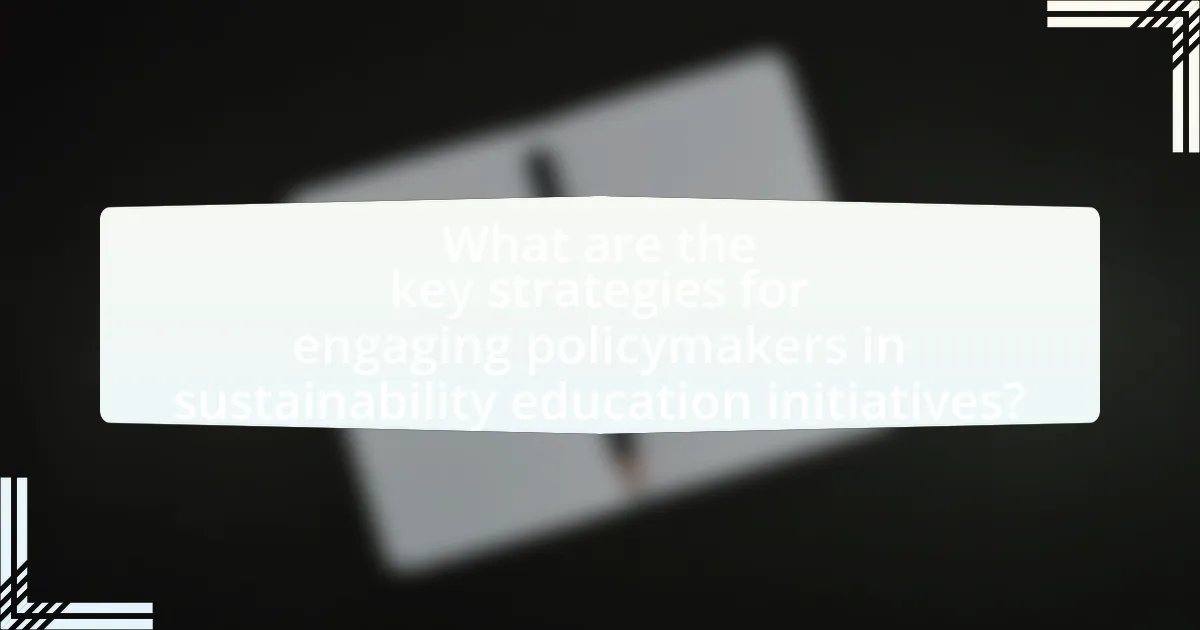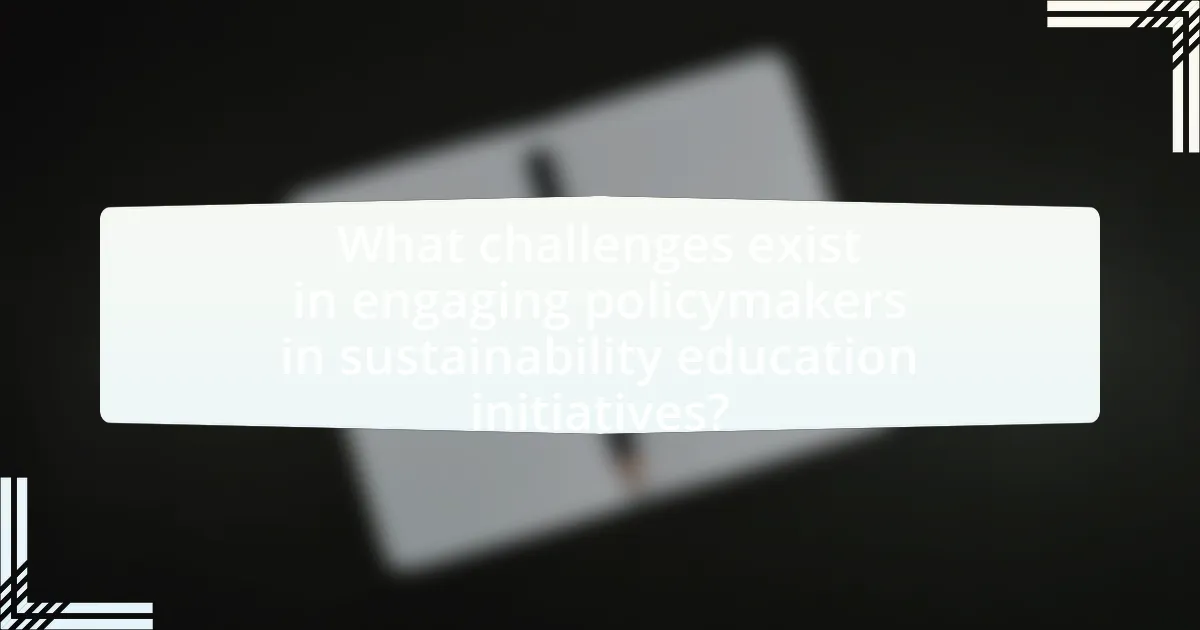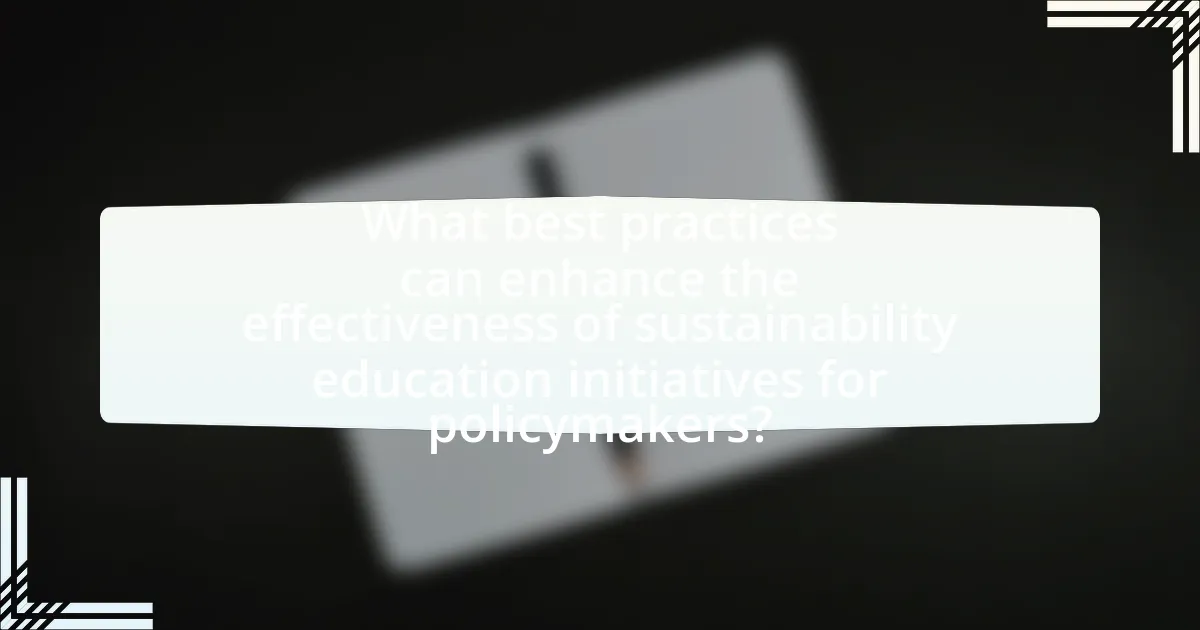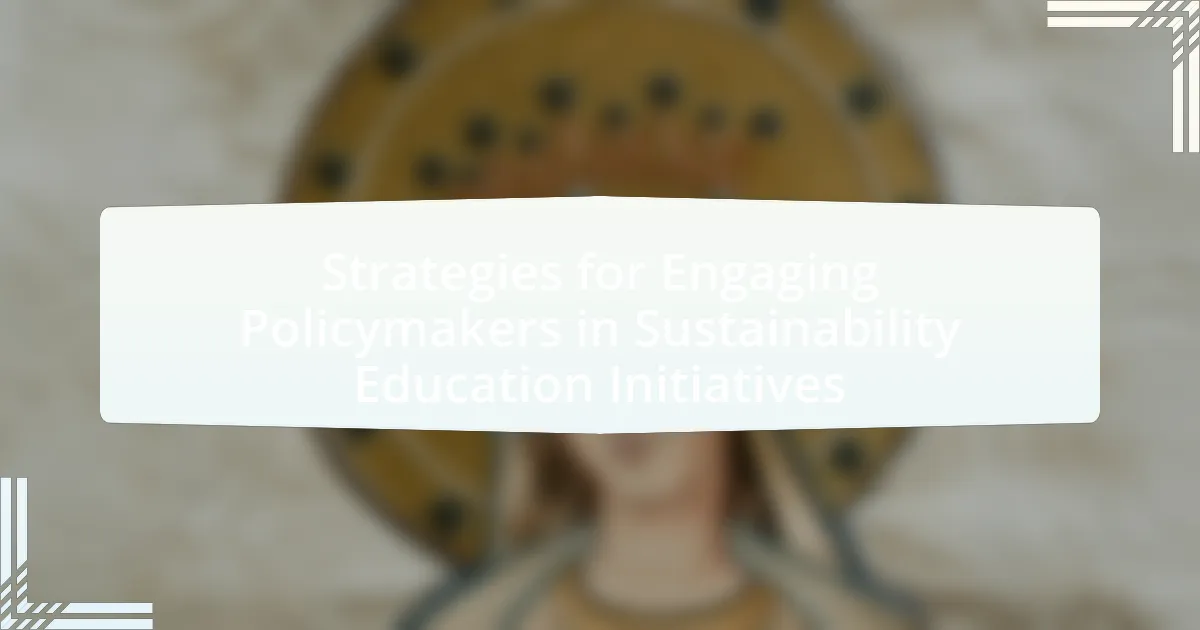The article focuses on strategies for engaging policymakers in sustainability education initiatives, emphasizing the importance of building strong partnerships, utilizing data-driven advocacy, and fostering community involvement. It outlines effective communication methods, such as policy briefs and storytelling, to enhance engagement and understanding among policymakers. The article also discusses the role of collaboration, the significance of understanding policymakers’ priorities, and the challenges faced in promoting sustainability education. Additionally, it highlights best practices, including leveraging data and continuous engagement, to sustain interest and support for sustainability initiatives among policymakers.

What are the key strategies for engaging policymakers in sustainability education initiatives?
Key strategies for engaging policymakers in sustainability education initiatives include building strong partnerships, utilizing data-driven advocacy, and fostering community involvement. Strong partnerships between educational institutions, NGOs, and government agencies enhance credibility and resource sharing, which is essential for effective policy influence. Data-driven advocacy, supported by research and statistics, demonstrates the tangible benefits of sustainability education, making a compelling case for policymakers. Additionally, fostering community involvement ensures that local voices are heard, creating a sense of ownership and urgency around sustainability initiatives, which can motivate policymakers to act. These strategies collectively create a robust framework for engaging policymakers effectively in sustainability education.
How can effective communication enhance engagement with policymakers?
Effective communication enhances engagement with policymakers by fostering clear understanding and collaboration on sustainability initiatives. When stakeholders articulate their goals, data, and impacts effectively, policymakers are more likely to grasp the significance of the issues at hand. For instance, research from the National Academy of Sciences indicates that concise and targeted messaging can significantly influence policy decisions, as it allows policymakers to quickly assess the relevance and urgency of sustainability challenges. This clarity not only builds trust but also encourages informed decision-making, ultimately leading to more effective policy outcomes.
What communication methods are most effective for reaching policymakers?
Direct, concise communication methods such as policy briefs, personal meetings, and targeted emails are most effective for reaching policymakers. Policy briefs provide succinct, evidence-based information that highlights key issues and recommendations, making them a valuable tool for busy legislators. Personal meetings allow for direct engagement, fostering relationships and enabling tailored discussions that address specific concerns or interests of policymakers. Targeted emails can effectively convey urgent messages or updates, especially when they include clear calls to action and relevant data. Research indicates that these methods enhance the likelihood of policymakers considering and acting on sustainability initiatives, as they align with their need for accessible, actionable information.
How can storytelling be utilized to convey sustainability education messages?
Storytelling can be utilized to convey sustainability education messages by creating relatable narratives that illustrate the impact of environmental issues on individuals and communities. These narratives engage audiences emotionally, making complex sustainability concepts more accessible and memorable. For instance, research shows that stories can enhance information retention by up to 65%, as they allow listeners to visualize scenarios and empathize with characters facing sustainability challenges. By incorporating real-life examples and personal experiences, storytelling effectively communicates the urgency of sustainability initiatives, thereby influencing policymakers to take action.
What role does collaboration play in engaging policymakers?
Collaboration plays a crucial role in engaging policymakers by fostering relationships that enhance communication and understanding of sustainability issues. When various stakeholders, including educators, researchers, and community leaders, work together, they create a unified voice that can effectively advocate for policy changes. This collective approach not only amplifies the message but also provides policymakers with diverse perspectives and data, making it easier for them to grasp the complexities of sustainability education. For instance, collaborative initiatives like the Partnership for 21st Century Skills have demonstrated that joint efforts can lead to more informed decision-making and the successful implementation of educational policies that prioritize sustainability.
How can partnerships with educational institutions strengthen initiatives?
Partnerships with educational institutions can strengthen initiatives by leveraging their research capabilities, resources, and networks to enhance program effectiveness. Educational institutions often possess specialized knowledge and expertise that can inform policy development and implementation, ensuring that initiatives are grounded in evidence-based practices. For example, collaborations can lead to the creation of tailored curricula that address specific sustainability challenges, as seen in programs developed through partnerships between universities and local governments. These partnerships also facilitate access to a broader audience, including students and faculty, who can contribute to advocacy efforts and community engagement, thereby amplifying the impact of sustainability initiatives.
What are the benefits of involving community stakeholders in the process?
Involving community stakeholders in the process enhances the effectiveness and relevance of sustainability education initiatives. Engaged stakeholders contribute local knowledge, ensuring that programs address specific community needs and challenges. Research indicates that initiatives with stakeholder involvement are more likely to achieve desired outcomes, as they foster trust and collaboration, leading to increased community buy-in and participation. For example, a study by the National Research Council found that community engagement in environmental decision-making significantly improves project success rates and sustainability outcomes.
Why is understanding policymakers’ priorities crucial for engagement?
Understanding policymakers’ priorities is crucial for engagement because it enables effective communication and alignment of goals. When stakeholders grasp what policymakers prioritize, they can tailor their messages and initiatives to resonate with those interests, increasing the likelihood of support and collaboration. For instance, research shows that initiatives aligned with economic growth or public health often receive more attention and funding, as these are common priorities for many policymakers. By focusing on these areas, advocates can present sustainability education initiatives as solutions that address pressing concerns, thereby enhancing engagement and fostering productive partnerships.
How can research inform the alignment of sustainability education with policy goals?
Research can inform the alignment of sustainability education with policy goals by providing evidence-based insights that identify effective teaching methods and content relevant to current environmental challenges. For instance, studies such as “Education for Sustainable Development Goals: Learning Objectives” by the United Nations Educational, Scientific and Cultural Organization (UNESCO) highlight how integrating sustainability concepts into curricula can enhance student engagement and awareness, thereby supporting policy objectives aimed at fostering sustainable practices. Additionally, research findings can guide policymakers in developing frameworks that ensure educational programs are not only aligned with sustainability goals but also adaptable to local contexts, as demonstrated in the “Global Education Monitoring Report” by UNESCO, which emphasizes the importance of context-specific strategies in achieving educational outcomes related to sustainability.
What strategies can be used to identify and address policymakers’ concerns?
To identify and address policymakers’ concerns, stakeholders can employ strategies such as conducting targeted surveys, organizing focus groups, and engaging in direct dialogue with policymakers. These methods facilitate the collection of specific insights regarding policymakers’ priorities and challenges. For instance, surveys can quantify concerns, while focus groups allow for in-depth discussions that reveal underlying issues. Engaging in direct dialogue fosters relationships and encourages open communication, enabling stakeholders to tailor their initiatives to align with policymakers’ needs. Research indicates that effective engagement strategies can lead to more informed decision-making and improved policy outcomes, as seen in various sustainability initiatives that successfully integrated stakeholder feedback.

What challenges exist in engaging policymakers in sustainability education initiatives?
Engaging policymakers in sustainability education initiatives faces several challenges, primarily due to competing priorities and limited resources. Policymakers often prioritize immediate economic concerns over long-term sustainability goals, which can lead to a lack of support for educational initiatives that require time and investment. Additionally, the complexity of sustainability issues can create a knowledge gap, making it difficult for policymakers to understand the importance and benefits of such initiatives. Research indicates that only 30% of policymakers feel adequately informed about sustainability education, highlighting the need for targeted communication strategies to bridge this gap. Furthermore, political polarization can hinder collaboration across party lines, complicating efforts to implement cohesive sustainability education programs.
What barriers do policymakers face in supporting sustainability education?
Policymakers face several barriers in supporting sustainability education, including limited funding, lack of awareness, and competing priorities. Limited funding restricts the development and implementation of sustainability programs, as many educational initiatives require substantial financial resources for materials, training, and outreach. Additionally, a lack of awareness about the importance and benefits of sustainability education can lead to insufficient political will and public support, making it difficult for policymakers to prioritize these initiatives. Competing priorities, such as economic growth and immediate social issues, often overshadow long-term sustainability goals, further complicating the integration of sustainability education into existing curricula. These barriers collectively hinder effective policymaking in the realm of sustainability education.
How can funding limitations impact sustainability education initiatives?
Funding limitations can severely restrict sustainability education initiatives by reducing the resources available for program development, implementation, and outreach. When financial support is inadequate, organizations may struggle to create comprehensive curricula, hire qualified educators, or provide necessary materials and facilities. For instance, a study by the National Education Association found that 60% of educators reported insufficient funding as a barrier to effective environmental education, leading to diminished student engagement and learning outcomes. Consequently, limited funding can hinder the overall effectiveness and reach of sustainability education programs, ultimately impacting community awareness and action on sustainability issues.
What misconceptions about sustainability education hinder policymaker engagement?
Misconceptions about sustainability education that hinder policymaker engagement include the belief that it is solely an environmental issue, that it requires extensive resources, and that it is not relevant to economic growth. Policymakers often perceive sustainability education as limited to environmental science, neglecting its interdisciplinary nature that encompasses social, economic, and cultural dimensions. This narrow view can lead to a lack of prioritization in policy agendas. Additionally, the assumption that sustainability education demands significant financial investment can deter policymakers from supporting initiatives, despite evidence showing that effective programs can be implemented with minimal costs and can yield long-term economic benefits. Lastly, the misconception that sustainability education does not contribute to immediate economic growth overlooks its potential to foster innovation, create jobs, and enhance community resilience, as demonstrated by various studies linking sustainability practices to economic development.
How can advocates overcome resistance from policymakers?
Advocates can overcome resistance from policymakers by employing evidence-based strategies that demonstrate the benefits of sustainability education initiatives. For instance, presenting data that highlights successful case studies, such as the implementation of sustainability programs in schools that led to improved student engagement and environmental awareness, can effectively persuade policymakers. Research from the National Education Association indicates that schools integrating sustainability into their curricula see a 20% increase in student participation in environmental activities, showcasing the tangible impact of such initiatives. By aligning their proposals with policymakers’ goals, such as economic growth or community well-being, advocates can further reduce resistance and foster collaboration.
What strategies can be employed to build trust with policymakers?
To build trust with policymakers, organizations should prioritize transparency, consistent communication, and evidence-based advocacy. Transparency involves openly sharing data, methodologies, and decision-making processes, which fosters credibility. Consistent communication ensures that policymakers are regularly updated on initiatives and outcomes, reinforcing reliability. Evidence-based advocacy, supported by research and case studies, demonstrates the effectiveness of proposed solutions, making it easier for policymakers to align with the initiatives. For instance, a study by the National Academy of Sciences highlights that transparent practices in environmental policy significantly enhance trust and collaboration between stakeholders and policymakers.
How can advocates effectively address skepticism regarding sustainability initiatives?
Advocates can effectively address skepticism regarding sustainability initiatives by providing transparent, evidence-based information that demonstrates the tangible benefits of these initiatives. For instance, studies show that cities implementing green infrastructure can reduce urban heat by up to 5 degrees Fahrenheit, leading to lower energy costs and improved public health. By sharing such data, advocates can build trust and counter doubts. Additionally, engaging skeptics in dialogue and showcasing successful case studies from similar communities can further alleviate concerns and foster a collaborative approach to sustainability.

What best practices can enhance the effectiveness of sustainability education initiatives for policymakers?
Best practices that can enhance the effectiveness of sustainability education initiatives for policymakers include integrating evidence-based research, fostering collaboration among stakeholders, and utilizing clear communication strategies. Evidence-based research ensures that policymakers receive accurate and relevant information, which can be supported by studies such as the 2020 report from the National Academies of Sciences, Engineering, and Medicine, which emphasizes the importance of data-driven decision-making in policy formulation. Collaboration among stakeholders, including educators, scientists, and community leaders, creates a comprehensive approach to sustainability education, as highlighted in the 2019 study by the World Resources Institute, which found that multi-sector partnerships significantly improve policy outcomes. Clear communication strategies, such as using visual aids and simplified language, enhance understanding and retention of complex sustainability concepts, as demonstrated by research from the University of California, which showed that visual learning increases engagement and comprehension in policy discussions.
How can data and evidence be leveraged to support sustainability education initiatives?
Data and evidence can be leveraged to support sustainability education initiatives by providing measurable outcomes that demonstrate the effectiveness of these programs. For instance, studies show that integrating data-driven approaches in educational curricula can enhance student engagement and retention of sustainability concepts, as evidenced by a 2019 report from the National Environmental Education Foundation, which found that students exposed to data-rich environmental education programs scored 25% higher on assessments compared to those who were not. Furthermore, using local environmental data can help tailor educational content to specific community needs, making the initiatives more relevant and impactful. This localized approach is supported by research from the Journal of Environmental Education, which highlights that contextualized data increases the likelihood of behavioral change among students and their families.
What types of data are most persuasive for policymakers?
Quantitative data, particularly statistics and empirical evidence, are the most persuasive for policymakers. This type of data provides clear, measurable outcomes that can demonstrate the effectiveness or impact of policies. For instance, studies have shown that presenting data on cost savings, such as a report from the American Council for an Energy-Efficient Economy, which found that energy efficiency programs can save consumers $500 billion by 2030, significantly influences policy decisions. Additionally, case studies that illustrate successful implementations of sustainability initiatives, supported by data on environmental and economic benefits, further enhance persuasion.
How can case studies demonstrate the effectiveness of sustainability education?
Case studies can demonstrate the effectiveness of sustainability education by providing real-world examples of successful implementation and measurable outcomes. For instance, a case study on the Green Schools initiative in California showed that schools implementing sustainability education saw a 20% increase in student engagement and a 15% reduction in energy consumption. These quantifiable results illustrate how targeted educational strategies can lead to significant environmental and behavioral changes, thereby validating the impact of sustainability education on both students and the community.
What role does continuous engagement play in sustaining policymaker interest?
Continuous engagement is crucial for sustaining policymaker interest as it fosters ongoing dialogue, builds relationships, and ensures that policymakers remain informed about relevant issues. This sustained interaction allows for the continuous exchange of information, which is essential for adapting policies to evolving challenges in sustainability. Research indicates that regular communication and engagement activities, such as workshops and briefings, significantly enhance policymakers’ understanding and commitment to sustainability initiatives, as evidenced by studies showing that engaged policymakers are more likely to support and implement effective sustainability policies.
How can follow-up strategies maintain momentum after initial engagement?
Follow-up strategies can maintain momentum after initial engagement by ensuring consistent communication and providing ongoing value to policymakers. Regular updates on progress, sharing success stories, and inviting feedback keep stakeholders informed and invested. Research indicates that sustained engagement increases the likelihood of continued support; for instance, a study by the National Academy of Sciences found that ongoing interactions significantly enhance collaboration and commitment among policymakers. By implementing structured follow-up plans, such as scheduled check-ins and resource sharing, organizations can reinforce relationships and drive sustained interest in sustainability education initiatives.
What are effective ways to celebrate successes and share outcomes with policymakers?
Effective ways to celebrate successes and share outcomes with policymakers include organizing formal recognition events, producing detailed reports, and utilizing social media campaigns. Formal recognition events, such as award ceremonies, highlight achievements and foster relationships with policymakers, as evidenced by the National Association of Counties’ annual awards that showcase successful local initiatives. Detailed reports provide comprehensive data and case studies that demonstrate the impact of sustainability education initiatives, which can influence policy decisions; for instance, the World Resources Institute publishes reports that effectively communicate outcomes to stakeholders. Social media campaigns can amplify successes and engage a broader audience, as seen in the #SustainableDevelopmentGoals campaign by the United Nations, which effectively shares progress and outcomes with policymakers and the public alike.
What practical tips can enhance engagement with policymakers in sustainability education initiatives?
To enhance engagement with policymakers in sustainability education initiatives, stakeholders should prioritize building strong relationships through consistent communication and collaboration. Establishing regular meetings and forums allows for the exchange of ideas and ensures that policymakers are informed about the latest developments in sustainability education. Research indicates that initiatives involving direct interaction, such as workshops or joint projects, significantly increase policymakers’ investment in sustainability efforts, as evidenced by the success of programs like the U.S. Department of Education’s Green Ribbon Schools initiative, which fosters partnerships between schools and local governments. Additionally, providing clear, data-driven evidence of the benefits of sustainability education can help policymakers understand its importance, as studies show that informed decision-making leads to more effective policy outcomes.

Leave a Reply